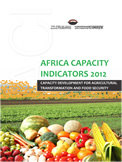
A core message in the 2012 ACI Report is that improving the productivity and the economic returns of agriculture has immediate effects on poverty and hunger in at least three important ways:
a) it increases the productivity and incomes of the majority of Africa’s poor, who work primarily in agriculture;
b) it reduces food prices, which affect real incomes and poverty in urban areas; and,
c) it generates important spillovers to the rest of the economy.
Yet, countries need capacities of all kinds to make these productivity improvements and secure the required economic returns. Overall, as judged at the ACI composite index level, whereas in 2011 there wasn’t a single country that classified in the “High” category of capacity, in 2012 one country (Ghana) improved by barely sliding into that Level. Also, there are notable improvements in “Development results at country level”, where the percentage of countries in the lowest levels (Low and very Low) decreased from 61.7% to 19%. The majority shifted from “Low” to “Medium” Level and one can observe a country (Ghana) in the “Very High” level. With this Report, ACBF hopes to bring political, policy, research, investment, and capacity development attention to the implementation, monitoring, and tracking issues holding back the transformation of African agriculture and the guaranteeing of food security for its growing and youthful population. Done right, agriculture can indeed transform Africa. But it needs to start by using agriculture to transform the structure of Africa's economies.





